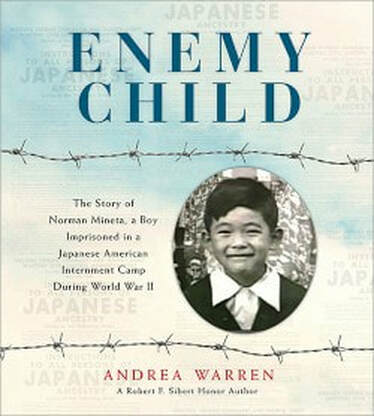Surviving an American Shameful Act with Dignity and Resilience
 Award-winning iNK author, Andrea Warren writes American history as seen through the eyes of a child who is confronted with problems of historic proportions created by grown ups. Her latest book is
Enemy Child: the Story of Norman Mineta, A Boy Imprisoned in a Japanese American Internment Camp During World War II.
On December 7, 1941, the date President Roosevelt called "a day that will live in infamy," the Japanese allies of the Axis Powers bombed Pearl Harbor in Hawaii. Thus began American involvement in Word War II. Ten-year-old American boy, Norman Mineta, the youngest of five children, was suddenly confronted with hateful bullying at school. His classmates accused him of perpetrating this dastardly act because he looked like the enemy.
Award-winning iNK author, Andrea Warren writes American history as seen through the eyes of a child who is confronted with problems of historic proportions created by grown ups. Her latest book is
Enemy Child: the Story of Norman Mineta, A Boy Imprisoned in a Japanese American Internment Camp During World War II.
On December 7, 1941, the date President Roosevelt called "a day that will live in infamy," the Japanese allies of the Axis Powers bombed Pearl Harbor in Hawaii. Thus began American involvement in Word War II. Ten-year-old American boy, Norman Mineta, the youngest of five children, was suddenly confronted with hateful bullying at school. His classmates accused him of perpetrating this dastardly act because he looked like the enemy.At first, Norm thought nothing would happen to his family because the Constitution says "No person shall be deprived of life, liberty, or property without due process of law." But gradually the discriminatory rhetoric and behavior towards Japanese Americans escalated, quickly culminating in Executive Order 9066 by President Roosevelt that led to the interment of 120,000 West Coast Japanese Americans, without a scintilla of "due process." The rationale, born of fear, was to make certain that they would not "collude" with the country of their ancestry. Warren is brilliant in interweaving this history with its impact on a boy who loved baseball and cub scouts and his family of seven, as they were ripped from their comfortable home in San Jose and herded on to long trains with covered windows. Their journey took them first to a single barrack's room in the middle of the Santa Anita Race Track until they could be dispatched to permanent barrack accommodations behind barbed wire and armed watch towers in the shadow Heart Mountain, Wyoming-- an austere, isolated landscape of high winds, frigid winters and baking summers. It was three years before they returned home to San Jose.
Norman Mineta survived, and in some ways thrived, during this unjust, punitive period, never losing his love for America. When he grew up, he ran for elected offices, first becoming the mayor of San Jose, then a congressman for 20 years. When he retired from congress he was a cabinet member for both Bill Clinton and George W. Bush. Through the Boy Scouts, Norm had made friends with Alan Simpson of Cody,Wyoming, during joint scouting activity at the internment camp. Years later they reconnected when Mineta was in the House of Representatives and Simpson was a Senator. Their friendship was renewed and together they worked to pass the Civil Liberties Act into law, 43 years after the war had ended. In it, America apologized to for the internment of Japanese American community and paid a reparation of $20,000 to each living survivor.
Enemy Child is an initiation into a dark period of American History. As a book for young adults, Warren assumes little or no prior knowledge of these events from the reader. Thus, as the story of Norman Mineta unfolds, so does its historical background. It is a powerful, poignant page-turning narrative of an American boy who was treated as a prisoner and reviled as an enemy because of his ancestry. But it is also a story of patriotism, honor, dignity and resilience from a family of immigrants who never, for one second, was disloyal to our country.
This book is not just for young Americans but for all of us. It's another important reason for adults to mine the great literature that awaits in the children's room of the library.
Published on May 06, 2019 07:12
No comments have been added yet.



